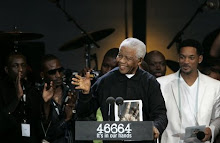
By Desiree Evans, Institute for Southern Studies
Eight years ago, I had the opportunity to experience one of the most moving events in my young career as a journalist and as an activist. In Durban, South Africa, I joined tens of thousands of people from around the world in attending the 2001 U.N. World Conference Against Racism, one of the largest international gatherings ever held to discuss the eradication of racism and related forms of intolerance.
At once both a life-changing and an eye-opening experience, I had the chance to sit down with a diverse array of grassroots activists and NGO delegates, many of whom had traveled thousands of miles to tell the stories of the struggles in their home countries. I spoke with rural woman campaigning for land rights in South Africa, indigenous leaders fighting for recognition in Bolivia and Dalits struggling for civil rights in India. Thousands of people of every race, ethnicity and religion came together from all corners of the globe to share these remarkable stories. And for me, a young African-American woman who had grown up poor in a small, rural Louisiana town, it was a powerful moment in which I came to see clearly the connection between communities of color struggling for rights in the United States and the global struggle for these very same rights.
While civil society leaders came together to share stories of their experiences with racism, discrimination, and government neglect, government delegates made commitments to combat racism in all its manifestations as part of their national and foreign policy agendas.
Of course, the 2001 conference was not without controversy. Even though more than 160 countries agreed on a landmark declaration to fight racism, the official U.S. delegation walked out in protest of language in the resolution that called slavery a "crime against humanity" and criticized Israel's treatment of the Palestinians. In walking out, the United States ignored the voices and stories of marginalized people of color from around the globe.
Fast forward to 2009. The time has come for the international community to review how much progress has been made with regard to the commitments and goals set forth in 2001. From April 20-24th, delegates from various countries and NGOs will convene in Geneva, Switzerland for the Durban Review Conference, dubbed "Durban II", for a follow up to the historic 2001 gathering. But once again, the United States may be absent from the discussion.
In February, after attending preparatory meetings for the follow-up conference, the Obama administration said it would not attend Durban II unless changes were made to the draft declaration, which criticized Israel's treatment of the Palestinians and called for reparations for slavery.
In response to the objections raised by negotiators from the Obama administration, diplomats revised the draft text, taking out the material that had been deemed "controversial." Even though the global community has gone to great lengths to accommodate Western concerns, the U.S. has still refused to end the boycott.
Because the Obama administration has declared a commitment to reengaging with the international community, human rights advocates see the U.S. refusal to participate in Durban II as a major setback for efforts to overcome racial inequality both domestically and around the world.
Communities of color and civil society groups in the United States, many of whom had hoped for better leadership from the Obama administration around issues of racial
 justice, have launched campaigns and written letters calling for U.S. attendance. The D.C.-based Robert F. Kennedy Center for Justice and Human Rights set up a petition and sent an urgent action alert, stating:
justice, have launched campaigns and written letters calling for U.S. attendance. The D.C.-based Robert F. Kennedy Center for Justice and Human Rights set up a petition and sent an urgent action alert, stating: Every UN member should take its seat at the negotiating table when talking about ending racism, racial discrimination and related intolerances. The United States has a critical leadership role to play to help level the playing field for minorities, indigenous peoples, migrants, and many other groups facing discrimination here and abroad.
With a financial crisis encircling the globe and inequality on the rise, it is more important than ever for nations to come together to fight racism and all forms of discrimination. I hope you'll join me in calling on President Obama to send an official U.S. delegation to the Durban Review Conference.
The Atlanta-based U.S. Human Rights Network, an umbrella group comprising hundreds of civil society organizations, also organized a petition and sent a letter to the Obama administration urging them to participate in the conference and underscoring that the failure to attend would undermine the administration's commitment to dialogue and diplomacy.
"If the Obama Administration is willing to engage in dialogue with avowed enemies such as Iran then surely it should be willing to engage the international community in a dialogue on methods and principles to end racism and xenophobia," Ajamu Baraka, Executive Director of the U.S. Human Rights Network, said in a press release.
The "South" as a Critical Lens
In the midst of celebrating the election of the first African-American U.S. president, the U.S. media and pundits were quick to declare the United States a "post-racial" nation. But those of us here on the ground bearing witness to the day-to-day realities facing communities of color and their grassroots struggles for justice know that a "post-racial nation" is far from a true reflection of what's going around the country.
The United States continues to suffer under the historical legacy of racism and institutional repression and the current realities of racial and ethnic discrimination. Here in the U.S. South, with its history of slavery and Jim Crow, we continue to see the consequences of the U.S. failure to address this racialized past, with health, education and the criminal justice systems mired in racial disparities.
Four years after I attended the Durban conference, I witnessed another event that would go on to shape my world-view: the break down of the levee system in New Orleans in 2005, and the drowning of a city I had long ago embraced as a second home.
 My work to record the failure of the local, state and national government to adequately address the needs of Katrina victims further brought home for me the connection between local U.S. struggles and those of marginalized communities across the world.
My work to record the failure of the local, state and national government to adequately address the needs of Katrina victims further brought home for me the connection between local U.S. struggles and those of marginalized communities across the world. The American South is itself a rough terrain of constant struggle, where issues of racism, militarism, displacement and migration play out in a myriad of ways. In this sense, the 2005 disaster along the Gulf Coast highlighted issues both national and international in scope. As a region the South has been underfunded and neglected by the government and overexploited by corporations for generations with little outside support. Yet, against massive odds grassroots groups in the South have waged campaigns against the institutional structures of racism and corruption, winning inspiring victories with international relevance.
In this way, the U.S. South and the "Global South" are not so vastly different. Communities of color have battled pollution and human rights abuses by oil companies in both the Gulf of Mexico and the Gulf of Guinea, and struggled against poverty in the Mississippi Delta as well as the Niger Delta. Afro-descendants in Colombia have struggled for the right of return to their lands along the coast of their country while displaced African-American Katrina victims have struggled to return to the coastal cities of their birth.
It is important to see these movements as critical representations of communities of color struggling for survival and against invisibility. Moreover, the Southern struggle is one that telegraphs the shared fates of working class people of color across the nation. It is at once both a national and international story.
At a time of global economic crisis, it is critical to recognize the ways that structural racism is working to sustain systems of poverty in the United States and abroad. The 2001 Durban resolution called on governments to adopt plans for addressing the poverty and social exclusion that results from racism. For this reason, U.S. domestic policies aimed at addressing racial disparities should be a priority during this economic crisis. As the recession deepens, it's communities of color who are disproportionately impacted by the downturn. When it comes to job loss, unemployment, foreclosures, homelessness, and poverty, people of color are experiencing these setbacks at double the rates of white Americans. In fact studies show that Black America is already in the middle of an economic depression.
Advocates in the United States underscore that the U.S. government must not only take appropriate measures to fulfill its commitments to improving domestic human rights, but it must also join in international efforts to root out institutionalized racism. The movements are indelibly connected.
A Change We Can Believe In?
Diplomats reached agreement Friday on a final declaration, omitting all references to Israel, Zionism, the Middle East conflict and other divisive issues in order to sway Western nations. But the West is still holding the process hostage in many ways -- following the United State's lead, Israel, Canada, Australia and the European Union have said they may not attend the conference. These are all nations with their own harsh legacies of racial and ethnic discrimination, but who have chosen to rally behind U.S. objections.
This week Navi Pillay, the top UN official for human rights, stressed the need for UN member states to put aside differences and to remember the meeting's importance to millions of victims of racism worldwide. But the question remains: will the United States be an obstacle in the fight against racial injustice or a leader?
During Barack Obama's presidential campaign, he promised a new era of multilateral engagement and diplomacy. Indeed, president Obama's election galvanized record numbers of marginalized communities across the country and around the world.
The pressure is now on the Obama administration to make real the promises of its campaign. In the U.S. South and the "Global South," communities of color are waiting for the new administration to show progressive leadership in the fight for racial justice. If the administration chooses to continue Bush-era policies of sidestepping critical global discussions of racism, the United States will be sending a message to the world at large that combatting racism and racial discrimination in all its forms isn't a critical human rights struggle.
Durban II promises to play a vital role in recommitting the global community to combating racism and racial discrimination. And now more than ever, the United States has to be willing to come to the table.
"The U.S. cannot provide the leadership necessary to promote and protect human rights by sitting on the sidelines," Kenneth Roth, Executive Director of Human Rights Watch, said in February.
Five months after the U.S. election of Barack Obama, there can be no doubt that as a nation we are still caught up in an incredibly historic moment in the struggle for racial justice. Now is the time to keep the forward momentum going.
The world is waiting and watching. Is the United States ready to make the sort of change racial justice advocates can believe in?
By Desiree Evans on April 17, 2009 8:47 AM








